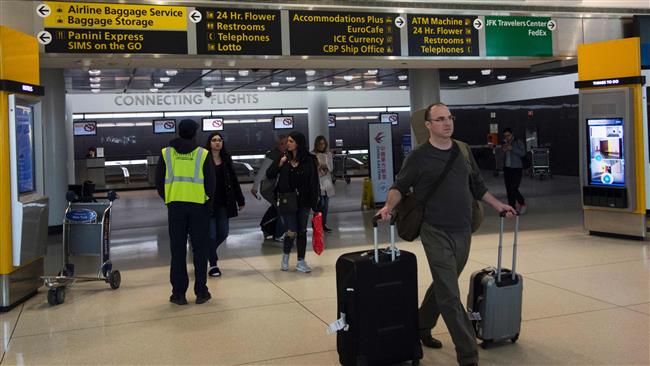US bill to end warrantless device searches at border
US Republican and Democratic senators have introduced legislation that would require border agents to have a warrant before searching the electronic devices of American citizens entering the country.
The new bipartisan bill tabled on Tuesday would prevent warrantless searches of Americans' phones, laptops and other digital devices at entries to the United States, potentially bringing immigrants coming to the country under greater scrutiny.
The legislation, called the “Protecting Data at the Border Act,” is deemed as a response to an increase in such electronic searches at airports and border crossings, stating that US nationals should be aware of their rights before giving up passwords and digital account information or handing over their devices to law enforcement officers.
"Americans' constitutional rights shouldn't disappear at the border… By requiring a warrant to search Americans' devices and prohibiting unreasonable delay, this bill makes sure that border agents are focused on criminals and terrorists instead of wasting their time thumbing through innocent Americans' personal photos and other data," said Democratic Senator Ron Wyden.
Republican Senator Rand Paul also noted that “Americans should not be asked to surrender their rights or privacy at the border, and our bill will put an end to the government’s intrusive practices."
The bill comes amid rising concerns among privacy advocates in recent months, with US President Donald Trump's administration fanning those concerns by the implementation of "extreme vetting" security checks to restrict the flow of immigrants and refugees into the country.
US Customs and Border Protection agency recently said that it had conducted 23,877 electronic media searches in 2016, a significant increase from 4,764 the year before out of nearly 400 million arrivals.

Trump’s election campaign had been marred by his disparaging remarks against minorities in the US, including a call to ban all Muslims from coming to America as well as stopping Mexican migrants by building a long wall along the US-Mexico border.
As the first step to deliver on one of his most divisive campaign pledges, Trump signed a directive to begin the construction of a wall on the border with Mexico just less than a week after assuming office in Washington.
The Manhattan billionaire also estimated the cost of erecting the wall, pledging to force Mexico to cover it.
Trump signed an executive order on January 27 that imposed a temporary travel ban on citizens from seven Muslim-majority countries, including Iran, Iraq, Libya, Somalia, Sudan, Syria and Yemen and placed an indefinite ban on Syrian refugees. The move also suspended admission of all refugees for 120 days.
The new US president came under immense pressure from politicians and rights groups to rescind the Muslim ban and the measure also created a global backlash with a growing number of countries including long-standing US allies criticizing the curbs as discriminatory and divisive.
In a revised order later, Trump removed Iraq from the original list because of concerns about the country’s role in fighting terrorism.
Trump says US will be ‘very strongly involved’ in Venezuela’s oil industry
‘Naked imperialism’: Netizens condemn US for attacking Venezuela and kidnapping its leader
How Gen. Soleimani fought terrorism and exposed the fallacy of West's 'war on terror'
Condemnations pour in after US bombing of Venezuela, kidnapping of Maduro
Gen. Soleimani represented resistance to interventionism in Global South: Analyst
‘Stronger resistance, declining US power’: IRGC marks Gen. Soleimani’s legacy
Harnessing one of world’s largest wind corridors in Iran
Iran denounces US strikes on Venezuela, urges UNSC to stop aggression










 This makes it easy to access the Press TV website
This makes it easy to access the Press TV website